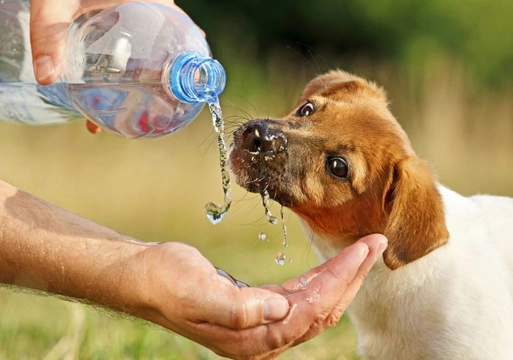
Rehydrating a dog that has been sick
Dogs can and will eat all sorts of disgusting things, and something that tastes good to them going down might not fare so well in their stomach! If your dog eats something that doesn’t agree with them, the body has a natural defence mechanism to limit the damage that this causes; clearing it out of the body as soon as possible, which usually means diarrhoea, vomiting or both! In some cases, vomiting is good for your dog; dogs that feel a little queasy will often eat grass, which will generally cause them to vomit a little later, and make them feel better.
While serious sickness or diarrhoea needs the prompt attention of your vet, minor bouts of stomach upsets that are short in duration and not regularly repeated will usually clear up on their own within 24 hours, and rarely need veterinary attention. However, dogs that are vomiting or have diarrhoea also run the risk of becoming dehydrated, which can lead to problems in and of itself. Dehydration is one of the most important problems to be on the lookout for in a dog that is sick, and doing what you can to keep them from becoming dehydrated or rehydrate them as soon as possible is important.
In this article, we will look at how you can provide hydration and rehydrate a dog that has had a bout of minor sickness or diarrhoea. Read on to learn more.
Signs of dehydration
Throwing up or having diarrhoea do not just remove unwanted food or unpalatable things from the body, but they also cause the dog to lose a lot of water. If the sickness or diarrhoea continues for more than 24 hours, or is very severe, you will need to take your dog to the vet. However, providing that you can keep your dog hydrated and clear up the problem within a day or so, this is often unnecessary.
In order to learn how to find out if your dog is dehydrated, check out the last section of this article.
Hydrating a dog whose stomach is rebelling!
Most dogs that have a minor bout of sickness and/or diarrhoea will be able to at least keep water down, and if after a few hours your dog cannot manage this, you will need to see the vet.
One of the best ways of stopping a bout of sickness or diarrhoea is by starving your dog for half a day or a day in order to give their stomach the chance to settle down before anything else is added to it. However, your dog should still be able to drink water during this time.
Your dog may like to lap a little water after a bout of vomiting, but if they bring this back up, take water away for a couple of hours to allow their stomachs a chance to calm down. After a couple of hours, offer your dog a shallow dish of fresh, clean water that is not too cold, and allow them to take a few sips, but not to drink an excessive amount.
If, after a quarter of an hour, your dog has not vomited again, repeat the process, and continue to do so every fifteen minutes until your dog has had enough. Then, water can be left down for them to drink freely.
If your dog is then able to keep water down reliably, you will need to look at trying to replenish some of the electrolytes that your dog’s body will have lost with their vomiting and diarrhoea. You can do this by providing an electrolyte supplement in their water, or by offering them some plain, thin chicken broth that is low in salt and does not contain any garlic, onion or other flavours or added ingredients.
A dog that is fasting due to vomiting or diarrhoea may be able to lap chicken broth instead of eating food, which will help to keep them hydrated and rebalance their electrolytes. However, if even broth seems to be coming right back out, go back to water fasting for up to 24 hours.
Once your dog has gone for 12 hours without vomiting or diarrhoea, you should be able to reintroduce them to food, slowly and carefully, ensuring that they do not eat too much, or anything likely to set them off again. A plain bland diet designed for sick dogs can be bought from most veterinary practices, such as tins or bags of a recovery food called Hills I/D.
Start by offering just a spoonful of food to your dog, waiting half an hour, and then trying another. Gradually increase the amount of food that you offer, watching for problems, and if your dog copes fine, they should be able to return to normal feeding the following day.
Remember that if you cannot keep your dog hydrated, or if their bout of vomiting or diarrhoea continues for more than 24 hours, they will need to see the vet.



